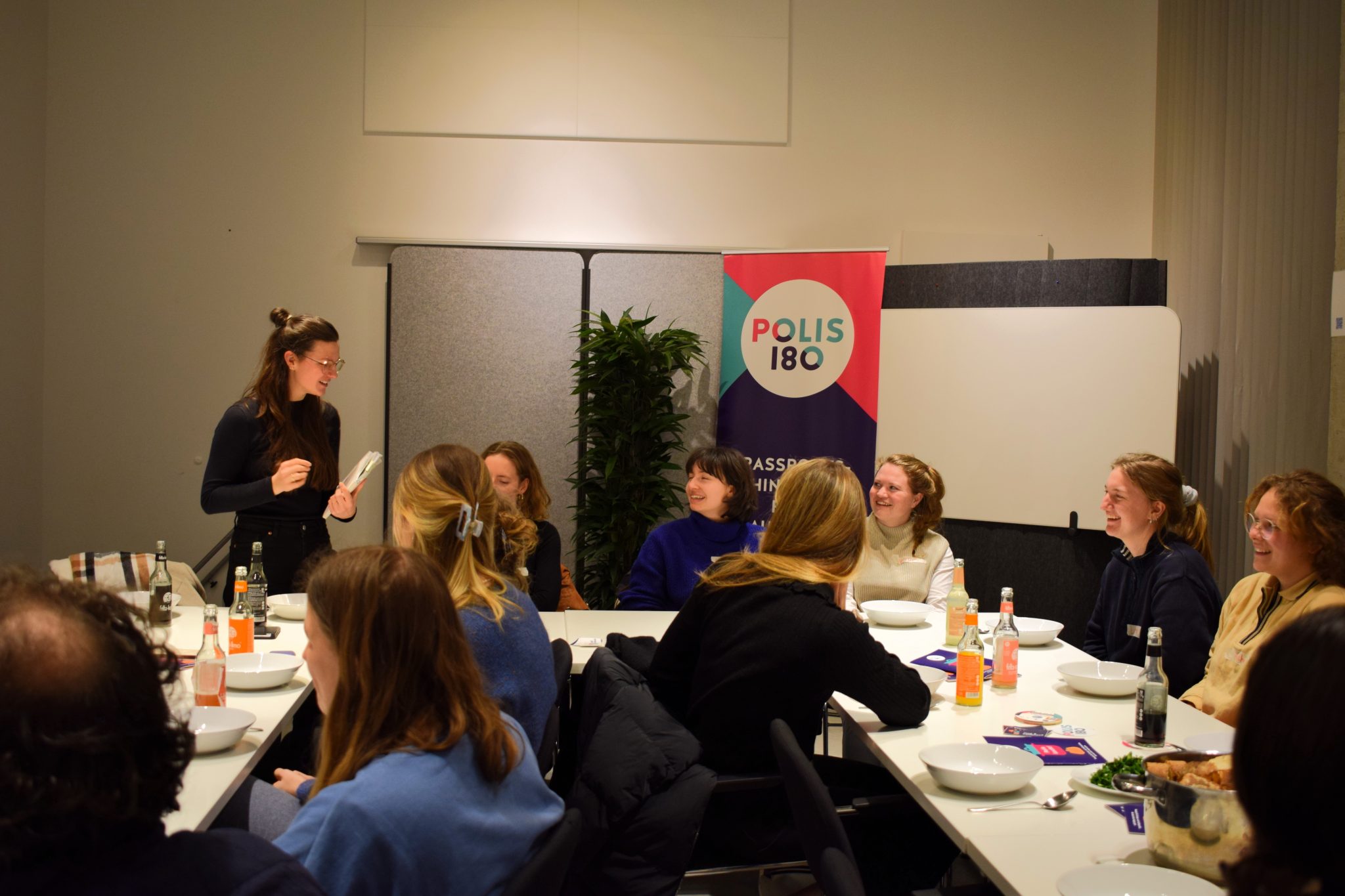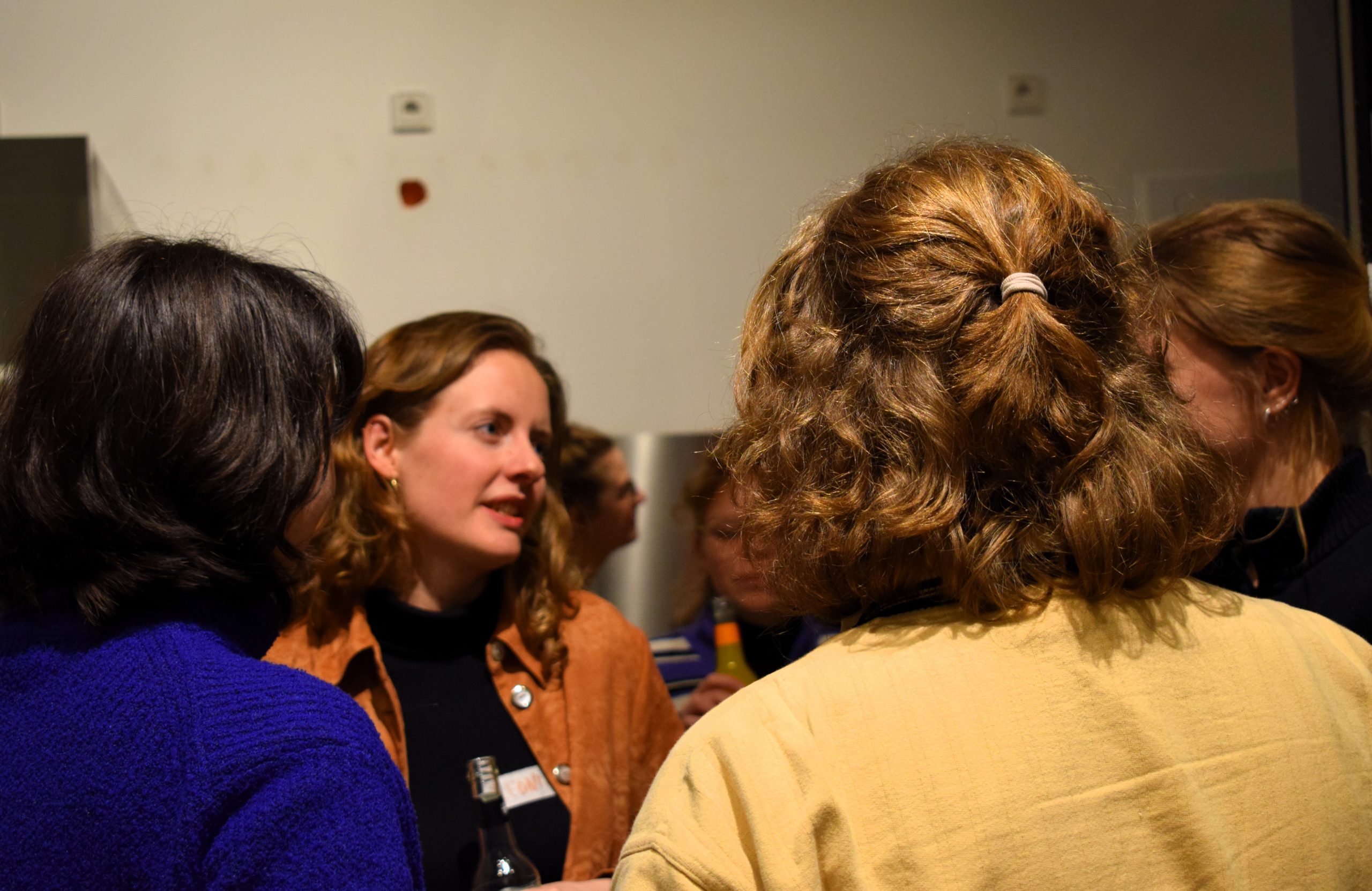As part of our Europa Kocht! series, and of our Gender & International Politics’ project Feminist Foreign Policy(s): An On-Going Journey through Global Policies, we discussed whether the EU is able to implement a Feminist Foreign Policy (FFP) approach to its foreign policy approaches and what such an FFP approach could look like with our wonderful speaker Leonie Stamm.
Leonie Stamm has been a research fellow at DGAP since November 2021. She works on topics related to feminist foreign policy, particularly its implementation in a German context and its implications for the international order and multilateral relations. Previously, Leonie Stamm worked at the Körber Foundation in the department of international affairs. In her studies, Leonie Stamm focused on German and international foreign and security policy, as well as on feminist foreign policy; gender and security; and the Women, Peace, and Security Agenda, in particular its implementation in Lebanon.
To start the event, Leonie Stamm introduced us to her understanding of FFP, both personally and professionally. For her, the concept is “an approach to foreign policy that at the very core aims to tackle a big flaw.” One example of such a flaw is the exclusion of diverse perspectives. Leonie Stamm believes this presents a normative argument for FFP, to reflect the diverse society that we live in. Furthermore, studies show that policies with more diverse perspectives are more sustainable. She further explained that FFP tends to rely on a framework of Rights, Resources and the Representation of women and marginalised groups, commonly known as the ‘three Rs’. Sweden pioneered this concept in 2014, with FFPs nowadays reflecting a broader discourse beyond women and girls to encompass more marginalised groups. Leonie Stamm argued the case for intersectionality in FFP-making, as the root causes for the discrimination faced by women and marginalised groups may be similar but policies must account for the diverse needs of such groups. Moreover, security is another layer to FFP. Traditionally, global approaches to security have been state-centric, whereas FFP is influenced by the concept of human security, which centres the people most affected by a policy and which originated in the UN in the 1980s.
The inclusion of different factors also means that there are various interpretations of FFP. This also counts for a possible FFP approach for the EU – what could a FFP look like for the EU, and what is the current state of affairs for FFP among its member states? While as many as 15 countries globally may be pursuing a FFP, Leonie Stamm argues that, in her view, a FFP for the EU is unlikely and also should not be pursued officially within the EU’s current structure. This is because EU members struggle to define a common foreign policy, let alone a FFP. Stressing that the EU would be unable to practise the policy, the implementation of a FFP may put the EU’s credibility as a FFP actor into question. However, she also noted that there is ample space for non-state actors to engage with FFP on the European level, such as members of academia and civil society, as well as individual state actors like Germany. That, however, should not mean that the EU should not implement the instruments and underlying principles of FFP in its foreign policy. In this regard, Leonie Stamm further emphasised that there would be different layers to FFP on the EU level, using Germany as a reference. The EU should work to make its FFP as inclusive of marginalised groups as possible, for instance, through the implementations of the three Rs. This means that, even though FFP is not specifically implemented in the EU, its ideas could be still a guiding notion. By strengthening art. 2 of the Treaty on European Union, pushing for gender-sensitive and transformative budgeting and by ensuring the representation of diverse voices within EU delegations, feminist approaches would be promoted in line with FFP’s objectives. However, our speaker outlined that a policy isn’t inherently more feminist if it is led by a woman. Similarly, quotas may be good for gender balance but they don’t necessarily determine how feminist a policy really is. Finally, the importance of civil society and EU external action are mentioned. Including civil society within the EU, FFP would institutionalise diverse voices at the EU level. Implementing FFP principles into the EU’s dealings on the international stage would also be vital, though, reality often lags behind the ideas discussed by policy-makers.

However, not just the external dimension was discussed but also the internal issues of the EU and their impact on a possible FFP. Here, our speaker argued that the EU needs to be a credible actor in this field. She explained that the German Foreign Office puts lots of emphasis on internal structural change through the implementation of what they call ‘feminist reflex’. Leonie Stamm also argued in favour of pursuing FFP through different methods, as we are unlikely to reach an endpoint where everything is ready to pursue an external FFP.
To tackle these obstacles, we also looked at best FFP practices and what lessons we can learn from states that have already implemented a FFP. Here, Sweden is a crucial example as it was the first country to adopt a FFP and had the longest-running policy. The fact that this was abolished by the far-right showed not only the endangerment of FFP by government changes but foremost the power this practice poses against the Right. Moreover, Canada was pointed out as a good example, due to its draft feminist assistance policy and reference in the German FFP guidelines. However, the measuring of its implementation mechanism isn’t comprehensive yet. Finally, Mexico was named as it arguably has the world’s most intersectional FFP and a strong focus on internal changes, although the country still has a high rate of femicides.
As a supranational institution, the EU consists of various states and policy competencies are divided between different levels, which could both help and hinder feminist approach, depending on the state and the specific political context. Another institutional struggle is the difficulties of the EU Council reaching a consensus on foreign policy. Leonie Stamm mentioned that there is an alliance called Friends of Feminist Foreign Policy at the EU-level, consisting of countries that officially pursue an FFP and of countries with goals that align with FFP but that don’t use it officially. Also, feminist figures on the EU level are crucial to shifting positions. Efforts of German MEPs such as Dr. Hannah Neumann and Delara Burkhardt to push aspects of feminism in decision-making are named here. Hence, there are institutional changes towards a feminist working observable on the EU level.

Not just the international community is confronted by current crises and violent conflicts but also FFP. Therefore, the discussion turned to the question of how conversations around FFP have changed due to the Russian invasion of Ukraine and the Israel-Palestine conflict. For Leonie Stamm, there were three crucial points concerning these issues. She spoke about the dilemma of whether arms deliveries can be considered feminist, a theory that puts antimilitarist perspectives to the test. She also noted how the reaction of the German governments towards the outbreak of protests in Iran in 2022 was disappointing for many. Finally, our
speaker viewed the Israel-Gaza conflict as presenting a difficult challenge to FFP. It raises questions of how to define security and whose security to centre in policy-making. Moreover, the conflict has made it more difficult for the German government to work with Arab civil society movements, as many have distanced themselves due to the government’s stance on the conflict, resulting in the loss of local expertise for the German Foreign Office.
So what about the future of an FFP for the EU? Are there too many cooks spoiling the broth or is there hope for an FFP for the EU? Our event concluded with a hopeful thought – FFP offers a new lens and a way to challenge traditional ways of looking at and doing foreign policy. Therefore, FFP may not be fully implemented at EU level in the near future, but its ideas, principles and concepts provide points for action and may well find their way into EU policies. There is great potential for civil society networking on FFP in the EU. By continuing to collaborate, critically engage and mobilise support for FFP, civil society can help pave the way for a more inclusive, equitable and feminist approach to EU foreign policy in the future – we need to stay tuned and keep working. The European elections offer an opportunity to continue doing so.
Event report written by Lara Brett and Lena Wittenfeld.
Organised by Lena Wittenfeld, Lara Brett, Sophie Domres and Gesche Andert.
We want to thank our sponsor, the Senatskanzlei of the Regierender Bürgermeister of Berlin.

